by Admin | May 28, 2014 | News
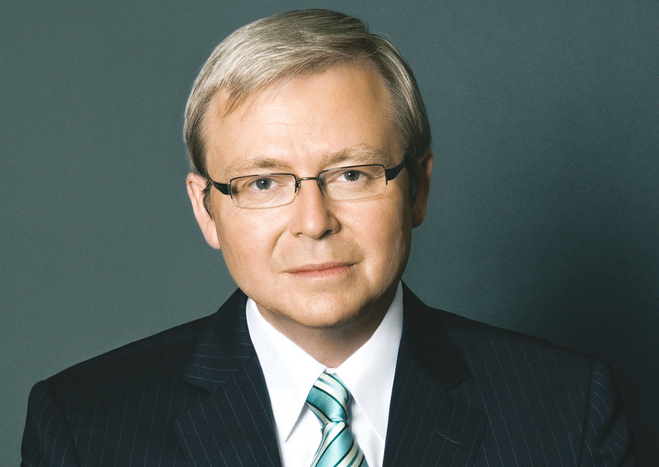
Former Australian Prime Minister Kevin Rudd is a senior fellow at Harvard Kennedy School’s Belfer Center for Science and International Affairs. His fellowship began in February 2014. At the Belfer Center, Rudd will lead a major research effort on possibilities and impacts of a new strategic relationship between China and the United States. Mr. Rudd served as Australia’s 26th Prime Minister from 2007 to 2010, then as Foreign Minister from 2010 to 2012, before returning to the Prime Ministership in 2013. As Prime Minister, Mr. Rudd led Australia’s response during the Global Financial Crisis. Australia’s fiscal response to the crisis was reviewed by the IMF as the most effective stimulus strategy of all member states. Australia was the only major advanced economy not to go into recession. Mr. Rudd is also internationally recognized as one of the founders of the G20 which drove the global response to the crisis, and which in 2009 helped prevent the crisis from spiraling into a second global depression. As Prime Minister and Foreign Minister, Mr. Rudd was active in global and regional foreign policy leadership. He was a driving force in expanding the East Asia Summit to include both the US and Russia in 2010. He also initiated the concept of transforming the EAS into a wider Asia Pacific Community to help manage deep-routed tensions in Asia by building over time the institutions and culture of common security in Asia. On climate change, Mr. Rudd ratified the Kyoto Protocol in 2007 and legislated in 2008 for a 20% mandatory renewable energy target for Australia. Mr. Rudd launched Australia’s challenge in the International Court of Justice with the object of stopping Japanese whaling in the Southern Ocean. Mr Rudd drove Australia’s successful bid for its current non-permanent seat on the United Nation’s Security Council and the near doubling of Australia’s foreign aid budget. Domestically, Mr. Rudd delivered Australia’s first national apology to indigenous Australians as his first act as Prime Minister. His government introduced Australia’s first ever nation-wide school curriculum. He legislated for the biggest school modernization program in Australian history with the construction of new state-of-the art libraries, classrooms and multi-purpose facilities for every Australian primary school. To overcome the digital divide, he provided lap top computers for every year 9-12 secondary school student. On health, Mr. Rudd in 2010 negotiated with the Australian states a National Heath and Hospitals Reform Agreement, the biggest reform and investment in the health system in 30 years. In defiance of Big Tobacco, his government introduced the world’s first plain-packaging regime for all tobacco products. To improve the rate of organ and tissue donation, he established Australia’s first National Organ and Tissue Transplant Authority. In 2010, his government introduced Australia’s first ever paid parental leave scheme. He also established Australia’s first ever dedicated Australian Children’s Network. Mr. Rudd remains engaged in a range of international challenges including global economic management, the rise of China, climate change and sustainable development. He is on the International Advisory Panel of Chatham House. He is a proficient speaker of Mandarin Chinese, a Visiting Professor at Tsinghua University and funded the establishment of the Australian Centre on China in the World at the Australian National University. He was a co-author of the recent report of the UN Secretary General’s High Level Panel on Global Sustainability – “Resilient People, Resilient Planet” and chairs the World Economic Forum’s Global Agenda Council on Fragile States. He also remains actively engaged in indigenous reconciliation.
by Admin | May 28, 2014 | News
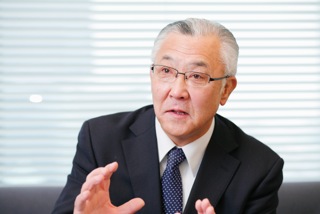
Currently Dean of the School of Political Science and Economics. After he earned his BA at the School of Law, Meiji University, he has shifted his focus of study from law to political science. He earned his MA in Comparative Politics at the Graduate School of Political Science and Economics at Meiji University. And, immediately after he completed all the necessary course work for Ph,D, he was given a position of lecturer at the School of Political Science and Economics. He has been with the same school ever since. In the meantime, he was a visiting scholar and professor at various institutions such as Asian Pacific Studies Institute of Duke University, the Department of Politics of Northeastern University, the National School of Public Administration of Laos, and the National University of Laos. Currently he has been studying the relationships between “political corruption” and the structure of government.
by Admin | May 28, 2014 | News
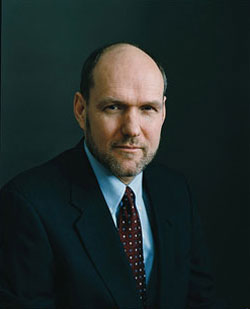
Stephen M. Walt is the Robert and Renee Belfer Professsor of International Affairs. He previously taught at Princeton University and the University of Chicago, where he served as Master of the Social Science Collegiate Division and Deputy Dean ofSocial Sciences. He has been a Resident Associateof the Carnegie Endowment for Peace and a Guest Scholar at the Brookings Institution, and he has also served as a consultant for the Institute of Defense Analyses, the Center for Naval Analyses, and the National Defense University. He presently serves on the editorial boards of Foreign Policy, Security Studies, International Relations, and Journal of Cold War Studies, and he also serves as Co-Editor of the Cornell Studies in Security Affairs, published by Cornell University Press. Additionally, he was elected as a Fellow in the American Academy of Arts and Sciences in May 2005.
Professor Walt is the author of The Origins of Alliances (1987), which received the 1988 Edgar S. Furniss National Security Book Award. He is also the author of Revolution and War (1996), Taming American Power: The Global Response to U.S. Primacy (2005), and, with co-author J.J. Mearsheimer, The Israel Lobby (2007).
by Admin | May 28, 2014 | News

M. Taylor Fravel is Associate Professor of Political Science and member of the Security Studies Program at MIT. Taylor is a graduate of Middlebury College and Stanford University, where he received his PhD. He has been a Postdoctoral Fellow at the Olin Institute for Strategic Studies at Harvard University, a Predoctoral Fellow at the Center for International Security and Cooperation at Stanford University, a Fellow with the Princeton-Harvard China and the World Program and a Visiting Scholar at the American Academy of Arts and Sciences. He also has graduate degrees from the London School of Economics and Oxford University, where he was a Rhodes Scholar. In March 2010, he was named Research Associate with the National Asia Research Program launched by the National Bureau of Asian Research and the Woodrow Wilson International Center.
by Admin | May 28, 2014 | News

Holly Morrow has expertise on Asia and energy issues from both the private and public sector. As former senior adviser for the Asia Pacific at ExxonMobil, she was responsible for analysis and strategy for the company on Asian political and economic affairs. Morrow served in a number of policy roles in the US government, including National Security Council Director for Southeast Asia, the Vice President’s Special Advisor for Asia, and China Desk Officer and Analyst in the Bureau of Intelligence and Research at the US State Department. She received her MA from Harvard University and her BA from Georgetown University.
by Admin | May 28, 2014 | News

Richard Rosecrance is an Adjunct Professor at Harvard’s John F. Kennedy School of Government, a Research Professor of Political Science at the University of California, Los Angeles. He was formerly a Professor at the University of California, Berkeley, and the Walter S. Carpenter, Jr., Professor of International and Comparative Politics at Cornell University. He served in the Policy Planning Council of the Department of State. He has written or edited more than a dozen books and many scholarly articles. The singly authored works include Action and Reaction in World Politics (1963); Defense of the Realm: British Strategy in the Nuclear Epoch (1968); International Relations: Peace or War? (1973); The Rise of the Trading State: Commerce and Conquest in the Modern World (1986); America’s Economic Resurgence (1990); and The Rise of the Virtual State: Wealth and Power in the Coming Center (1999). The edited volumes include The Dispersion of Nuclear Weapons: Strategy and Politics (1964); The Future of the International Strategic System (1972);America as an Ordinary Country (1976); The Domestic Bases of Grand Strategy(1993); The Costs of Conflict (1999); and The New Coalition of Great Powers(2001). He is the principal investigator of UCLA’s Carnegie Project on “Globalization and Self Determination”. He has received Guggenheim, Rockefeller, Ford, Fulbright, NATO, and many other fellowships. He was President of the International Studies Association and served as Director of UCLA’s Center for International Relations from 1992 to 2000. He has held research and teaching appointments in Florence (the European University Institute); Paris (the Institut de Sciences Politiques), London (Kings College London, the London School of Economics, and the International Institute for Strategic Studies), and Canberra (The Australian National University). He has lectured widely in East Asia and Europe. His recent book on the “virtual state” has been translated into Japanese, Chinese (Taiwan), German and will shortly appear in Arabic and Mandarin and in a French volume of colloquy and comments of French scholars entitled “Débat sur L’État Virtuel“. Professor Rosecrance is now at work on a book on international mergers which compares U.S. with European political and economic strategies.
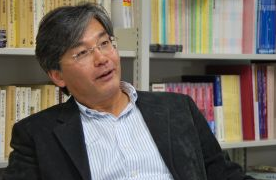
by Admin | May 28, 2014 | Highlights
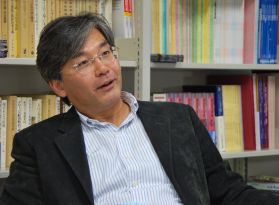
(BGF) – Recently, BGF was fortunate to have the chance to talk with Professor Shigeto Sonoda, professor of sociology and Asian studies at the University of Tokyo. BGF asked Professor Sonoda, who was a participant in BGF’s April 24th conference, for his views on how resolve the tensions between China and Japan, as well as the role of the United States. Professor Sonoda’s response, and thoughts on the conflict, are provided below.
Prof. Sonoda: There are some measures that can be taken to solve this problem. The Japanese side and Chinese side should move a little bit behind – both sides should refrain from being too aggressive by stating only their own standpoint or maintaining their own perspectives.
The second point is that, especially the Japanese side, should refrain from using history issues. When the Japanese Government, especially Prime Minister Abe, tried to challenge the issue of history or textbook issues then it is quite difficult for him to get the kind of support from intellectuals in the global community. So, he or the government in Japan, should make a clear statement that they are dealing with the issue of history for a more positive, bright future. At the same time, China or the Chinese Government, should refrain from using the history card to make their standpoint much better in the global community.
Thirdly, and most importantly, some of the professors have a lot of negative and pessimistic ideas about the impact of the so-called soft power. I think soft power matters and soft power is really important to find a better way to solve the tension between Japan and China. I have talked to a lot of researchers about the people’s attitudes toward Japan in China and toward China in Japan. It’s quite evident that those who have close contact with the people in different countries have more positive attitudes towards their contemporary relations, as well as future prospects. One of the tragedies of the tension between Japan and China is that the main character has been the government, not the citizens and the people who have close network with other countries. Those who have a close network with China in Japan are looking at the Japanese Government’s situation rather from pessimistic perspectives – they are simply worrying. I think the same can be said of the Chinese citizens who have many friends in Japan and who are exposed to Japanese popular culture in China.
So, speaking of the U.S. role, the U.S. should take a more mutual position by taking advantage of geographical distance to let two sides speak and exchange ideas together. I think this would be the best way to solve the tension between Japan and China.
BGF: Please comment on the article in the New York Times April 23 : “Pacific Rim Deal Could Reduce Chance of Unintended Conflict in Contested Seas ?”
Prof. Sonoda: I agree with the idea of Ian Storey, who mentioned that the approval on the code is “a very positive development, but it remains to be seen how effectively it will be implemented”. Approval is just an approval. More solid foundation is needed between China and Japan.
BGF: Can “soft power “overcome “hard power” if China elects to use it?
Prof. Sonoda: Yes, definitely. Domestically Chinese politics will operate if people will believe in whether the politicians’ words are “culturally/morally justifiable. The same can be said to the diplomacy.
BGF: Regarding another party in this region….How could Japan/China utilize ASEAN (Association of South East Asian Nations) to address their dispute as well as stabilize the political situation, given that China is also having some territory conflicts with a few ASEAN countries ?(China and Japan are currently active members of ASEAN + 3).
Prof. Sonoda: ASEAN is an important international political actor. Both Japan and China should listen to their voices. Solving territorial issues in international settings is of great importance in order to stabilize international political situation. Both Japan and China should know that they will not be able to persuade the third countries that their claim is justifiable unless they could persuade ASEAN.
BGF: China leaders are too aggressive which gives rise to extreme nationalism. They tend to only think about their benefit…What sort of compromise solution would China have to accept?
Prof. Sonoda: “Losing face” is the worst scenario for China’s diplomacy. If no countries around China will support her nationalist claims, they might “lose face.” Neighboring countries, not US alone, should unite together and approach China softly – I think this would be the best way to draw China’s compromise.
BGF: If BGF did have solutions, how could Governments be convinced to accept and apply them?
Prof. Sonoda: Solutions proposed by BGF should be balanced and convincing to both governments. Otherwise, governments will not listen to BGF.
BGF: In solving conflicts between Japan and China which country would find it more difficult?
Prof. Sonoda: China. Because China has territorial issues with other Asian countries. Their attitude toward Sino-Japan relations will influence Sino-Vietnamese relations and Sino-Filipino relations, too. Of course Japan has territorial issues with South Korean and Russia, but Senkaku issue has little to do with Takeshima/Dokdo issue or south Kuril Islands issue because they are located in different sea.
BGF: What incentives and disincentives can the U.S. use to encourage Japan and China to take constructive unilateral or bilateral steps to reduce tension and to work toward an eventual peaceful outcome? In short, realistically, what tools does the U.S. have and can it use really use those tools?
Prof. Sonoda: Words. US should strongly accuse both China and Japan of their failure to maintain peaceful relationship between them.
BGF: What price each party (China, Japan and U.S.) is willing to pay if war breaks out in Northeast Asia?
Prof. Sonoda: Both sides don’t think of paying cost for the break of war. Weight of life in China used to be lighter than that of Japan, let’s say, fifty years ago when China was under the Cultural Revolution for the “class struggle.” But economic growth in China produced (upper) middle class who fears the loss of the fortune, including their own life. As China’s politics is heavily dependent on (upper) middle class, it is unimaginable that China is willing to pay cost for another big war.
BGF: There are so many rumors about the potential conflict between China and Japan due to the Senkaku/Diaoyu islands dispute. How could the US prevent such event happen between their closest ally and their biggest debt owner (also biggest rivalry in the region)?
Prof. Sonoda: Again words are very important. US should respect China and create (spatial and psychological) space to discuss ideas. Most important thing is not to let “(oral) quarrel” change into “(physical) fighting and war.”
BGF: Now the Obama Administration is talking the strategic ‘pivot’ to Asia. It sounds nice and fancy. But what do you think is the most effective mechanism for the US to project their power in the context that China is now fiercely stretching their muscles and asserting their claims?
Prof. Sonoda: Using “soft power” is important. As my own survey research prevails, many domestic Chinese students even in elite universities do not know how neighboring countries are looking at China. US, which has many good universities and research institutes, should make a voice and persuade her in a scientific and moral way. Now US has many brilliant students from China who will be a future leader. Why not use “soft power” for peace building?
BGF: Last year, China established the ADIZ in the East China Sea that has raised the afraid it will continue up ADIZ in South China Sea . How do you evaluate about this risk? Its effects, especially with countries like Vietnam, the Philippines? There are evaluating if the Chinese do this, it will be a risky step. What is your opinion?
Prof. Sonoda: Yes, it’s really risky. But China sometimes tries to set up criteria /standard/ law of their own even when they try to solve “international affairs.” Surrounding countries and US should keep on claiming its danger and the necessity to talk with us.
BGF: About China’s ADIZ, U.S movement as of expressing alliance with Japan is widely considered lacking of resolute, tough. Some analysts also stated U.S. strategy with China increasingly vague, and soft. According to you, this choice is a kind “soft power” or the weakness of Obama?
Prof. Sonoda: It’s not “soft power” at all. Probably US’s message is not clear enough.
BGF: Given the current problems in the Ukraine Do you think China will be more proactive in pushing her goals of aggression as the world’s attention is directed elsewhere?
Prof. Sonoda: Possible. China is now following the Russian way to “secure oil.” More important thing is how to construct “international resource management regime” that China can accept.
BGF: Do you think that China or Japan would risk going to all out war with their current economic situations?
Prof. Sonoda: NO. I hope not. Both governments are seeking for “peaceful” solution for their territorial issues even though they keep on claiming their own legitimacy.
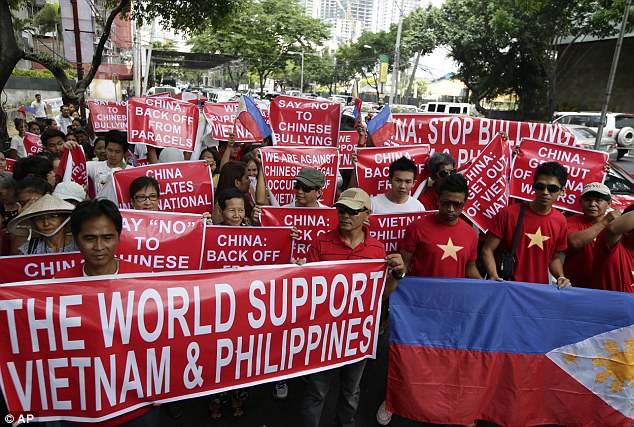
by Admin | May 28, 2014 | News

(Photo Credit: AP)
(BGF) – This recent article, published in The Economist, discusses the relative impunity China is able to act with in its territorial disputes in the South China Sea. As the article notes, China’s actions, such as placing an oil rig off the coast of Vietnam or its potential plans to build on the Johnson South Reef in violation of its agreement with ASEAN, have elicited objections from Vietnam and the Philippines, but such objections have had only a minimal substantive impact, at best. Click here to read the full article or visit The Economist‘s website.
Force Majeure
The Economist
FOR a man leading a country castigated in the official Chinese press as America’s “paranoid junior ally”, President Benigno “Noynoy” Aquino of the Philippines seems both remarkably relaxed and surprisingly conciliatory. Territorial disputes in the South China Sea, which prompted China Daily’s scolding, are not, Mr Aquino says, the “be-all and end-all” of his country’s relations with China. He has to manage the “tension between being as forthright as possible and weighing whether or not I am tweaking their nose”. As he spoke to Banyan this week in the presidential palace in Manila, the non-nose-tweaking side of Mr Aquino’s internal debate seemed to be winning: bilateral trade and tourism are booming, both sides are trying to “isolate” the complex row from the broader relationship, and Mr Aquino has tried not to respond to “provocative statements”.
Yet recent weeks have seen China engage in behaviour in the South China Sea that shows total disregard for the noses of its neighbours. In the northern part of the sea, near the Paracel islands, which it disputes with Vietnam, China has moved a massive oil rig, defended by a large flotilla, into waters Vietnam regards as within the Exclusive Economic Zone (EEZ) it is entitled to under the international law of the sea. Anger at this in Vietnam sparked rioting in which hundreds of factories were looted and torched and six Chinese died. China has since evacuated thousands of its expatriate workers and demanded compensation. Few of the ravaged factories were in fact Chinese-owned. Most were investments from Taiwan. So the destruction has both lost Vietnam any moral advantage and suggested more may be going on than simple patriotism turned on a historical enemy.
Farther to the south, photographs have shown China engaged in filling in the sea at the Johnson South Reef, in the Spratly chain of islands. Some analysts suggest that China intends to build an airstrip there. The Philippines has protested. It regards the reef as within its EEZ. And a declaration signed in 2002 by the ten-member Association of Southeast Asian Nations (ASEAN) and China bars new building on disputed rocks.
Perhaps most outrageous, China does not even deign to explain the basis of its claims. In the case of the oil rig, for example, it might regard the area where it is operating as part of the EEZ attached to Hainan province, an undisputed part of its territory. Or perhaps it belongs to the Paracels, from which China expelled the former South Vietnam in 1974. Or perhaps it is just encompassed by the “nine-dash line”, a lolling tongue of passive cartographic aggression that China says gives it historical rights over almost the entire South China Sea. The nine-dash line is itself ambiguous. Chinese scholars say that it probably implies a claim to the land features inside the line, an interpretation which could in theory be squared with the law of the sea. But even they are not sure that it does not assert sovereignty over the water as well.
In the face of all this Mr Aquino tempers his outrage with realism. “They are 1.3 billion people and we are 98m”, he says. This echoes the words of the then Chinese foreign minister in 2010, who reminded ASEAN that “China is a big country and other countries are small countries and that is just a fact.” A sober assessment suggests that none of the three approaches the Philippines has adopted to resist Chinese encroachment stands much hope of success—though they have certainly annoyed China.
Click here to continue reading.
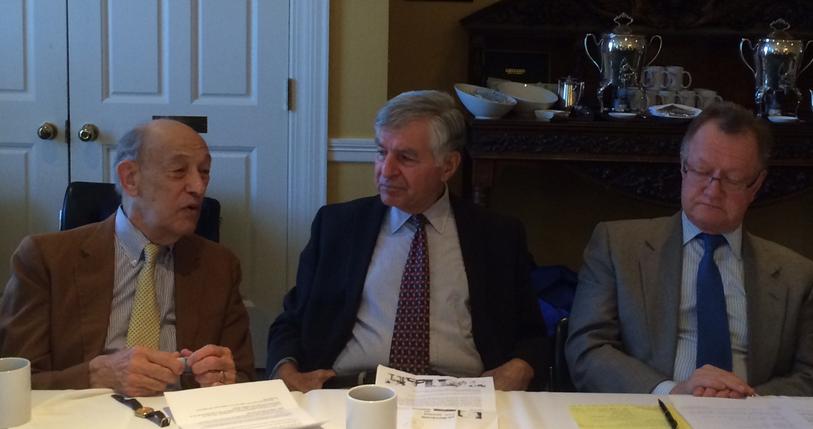
by Admin | May 28, 2014 | Highlights
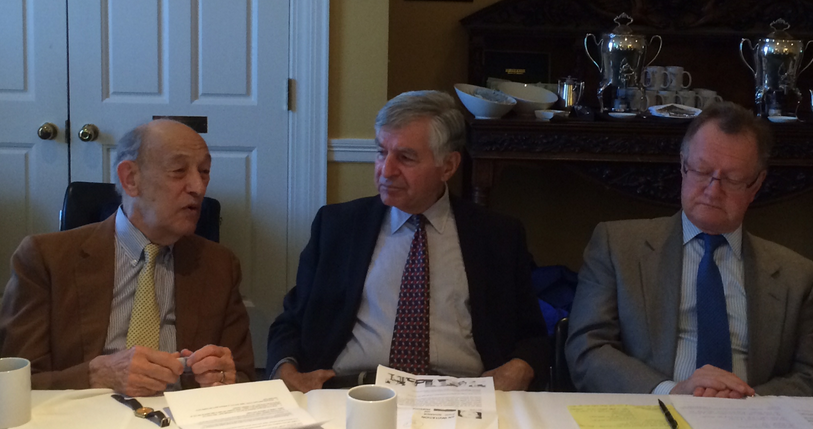
(Governor Dukakis with Professor Ezra Vogel and BGF cofounder, Professor John Quelch, at BGF’s April 24th Conference)
Recently, the international community has been witness to ever increasing tensions in the East and South China Seas as a result of territorial disputes between China and its neighbors. Scholars and experts have noted that these tensions threaten – not only the relations between China and its neighbors – but also the stability, peace, and prosperity of the region. Easing tensions in the East and South China Seas is of critical international importance.
In order to help advance the efforts to ease tensions, the Boston Global Forum (BGF) has implemented its new Boston Global Forum Initiative, which seeks to aid in resolving disputes and conflicts between China and Japan, China and Vietnam, and China and the Philippines. BGF will organize an international conference on the topic and asks that Secretary of State John Kerry joins us as the conference host. We ask that Secretary Kerry invite distinguished participants, such as Shinzo Abe, the Prime Minister of Japan; Li Keqiang, the Premier of China; Nguyen Tan Dung, the Prime Minister of Vietnam; and Benigno Aquino III, the President of the Philippines. Additionally, the conference will include many observers who are integral to the region, such as the Prime Ministers and/or Presidents of Indonesia, Australia, South Korea, Indonesia, and Malaysia. Additional attendees such as Ban Ki Moon, Secretary-General of the United Nations; Professors Joseph Nye and Ezra Vogel of Harvard University; Tommy Koh, Former Ambassador of Singapore to the United States and International Lawyer; Chan Heng Chee, Former Singapore Ambassador to the United States; Governor Michael Dukakis, Chairman of Boston Global Forum; and Nguyen Anh Tuan, Editor-in-Chief of Boston Global Forum.
The conference will be a crucial component of the Boston Global Forum’s year-long effort to encourage peace and understanding amongst China and its neighbors. In addition to the conference, BGF will advise several other actions to promote peace and stability in the South and East China Seas. First, the Boston Global Forum calls on the international community, including the United States and the European Union, to closely observe the tensions surrounding China’s oil rig in the waters off the coast of Vietnam, and, to send naval vessels to observe the crisis and deter conflict.
Secondly, the Boston Global Forum will award the “BGF Global Media Award,”which will honor the best ideas and products to deter conflict in the East and South China Seas. The award ceremony will take place on Oct 3, 2014, at the historical Loeb House at Harvard University with world leaders in attendance. The award winners will be honored and archived in the Boston Global Museum.
Finally, the Boston Global Forum will host a global art competition called the “Art Competition for Peace in Asia Pacific”. The art competition will be a component of the BGF Global Media Award. The Boston Global Forum encourages people from around the world, particularly countries such as China, Japan, Vietnam, and the Philippines to participate in the competition. Entries to the competition will consist of multimedia productions that call for peace in the Asia Pacific Region.
The recent tensions in the East and South China Seas have been a cause for concern. However, by bringing the international community together through the Boston Global Forum Initiative, the Boston Global Forum hopes to help ease tensions and prevent future conflicts. We sincerely hope that Secretary John Kerry will host this important meeting and that the leaders of China, Japan, Vietnam, the Philippines, and neighboring countries will attend the conference. The international community’s role is also integral, and we hope global citizens will participate in the BGF Global Media Award and global art competitions.
Through international cooperation, we can ensure that Asia remains peaceful, stable, secure, and prosperous.
Governor Michael Dukakis, Chairman of Boston Global Forum.










